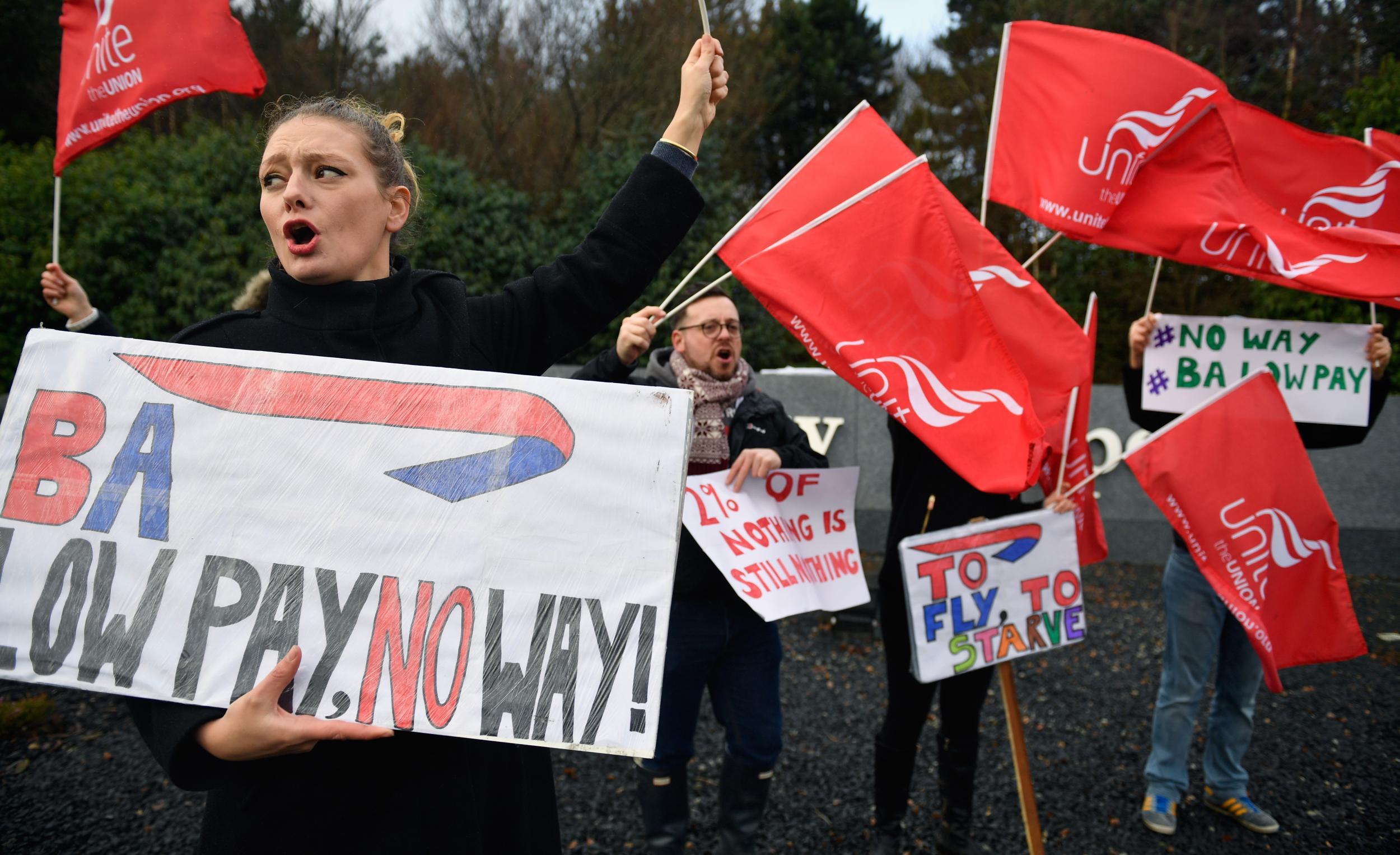British Airways strikes latest: Why can't the airline and the union agree how much staff actually get paid?
BA and Unite union trade claims and counter-claims on strikes over 'poverty pay'

Your support helps us to tell the story
From reproductive rights to climate change to Big Tech, The Independent is on the ground when the story is developing. Whether it's investigating the financials of Elon Musk's pro-Trump PAC or producing our latest documentary, 'The A Word', which shines a light on the American women fighting for reproductive rights, we know how important it is to parse out the facts from the messaging.
At such a critical moment in US history, we need reporters on the ground. Your donation allows us to keep sending journalists to speak to both sides of the story.
The Independent is trusted by Americans across the entire political spectrum. And unlike many other quality news outlets, we choose not to lock Americans out of our reporting and analysis with paywalls. We believe quality journalism should be available to everyone, paid for by those who can afford it.
Your support makes all the difference.Days before some British Airways cabin crew at Heathrow begin a second wave of strike action, the airline and the Unite union have made conflicting claims about the subject, and the impact, of industrial action.
The dispute involves Unite members working for BA’s Mixed Fleet operation at Heathrow. These cabin crew are deployed on around 50 routes, including services to Manchester, Moscow, Las Vegas, Miami, Cape Town and Singapore.
The majority of routes from Heathrow will not be affected; they are crewed by Euro Fleet and Worldwide Fleet. Flights from Gatwick, London City and Stansted are also unaffected.
Mixed Fleet was created as part of the settlement of the last dispute between BA and Unite, which ended in 2010. Since then, all new recruits to Heathrow-based cabin crew have joined Mixed Fleet, and are employed on less-favourable terms than longer-serving staff.
In a bid to improve what the union terms “poverty pay”, members went on strike on 10 and 11 January. Now a three-day stoppage has been called from Thursday 19 to Saturday 21 January.
But the two sides do not agree on the issue at the heart of the dispute: how much Mixed Fleet cabin crew actually earn in a year.
The union says: “Basic pay starts at just £12,192 with £3 an hour flying pay.” The £3 is paid for all hours on duty, whether or not the employee is in the air. Unite estimates that the average member of Mixed Fleet earns £16,000 annually, including allowances.
Yet BA says it has checked the pay of full-time Mixed Fleet crew, and insists the least that anyone earned in a year was £21,151. The average was over £24,000 — 50 per cent higher than the union’s estimate.
A spokesperson for BA said: “Our audited payroll data, which we’ve offered to share with Unite, includes the salaries of all Mixed Fleet crew, including new starters on basic pay of £12,192. We made it clear that our figure was based on those working full time.”
The effect of the first 48-hour strike is also hotly disputed.
The Independent calculates from publicly available, legally required data that 44 flights to and from Heathrow were grounded by the strike, of which all but three were domestic and European. This represents 2.75 per cent of the total BA Heathrow flights over the two strike days.
British Airways agrees with these figures. But Unite says the total number of cancellations was more than twice as many: “around 100”.
In addition to the 44 cancelled flights, The Independent has identified a further 28 flights covered by aircraft “wet-leased” by BA from other operators. During the industrial action, BA chartered planes and crew from Titan Airways to cover some short-haul flights, and notified passengers in advance of the change.
While it is clear that BA was obliged to hire extra aircraft while its own stayed on the ground, from the point of view of the travelling public these departures were not cancelled.
The Independent asked Unite for specific flight numbers to substantiate its claim of “around 100” cancellations, but these were not forthcoming.
Both sides, as well as passengers, want a settlement to avoid further strikes. Immediately before Christmas it appeared they had one. An agreement was hammered out after intense negotiations between BA and Unite’s general secretary, Len McCluskey.
The strike planned for 25 and 26 December was called off, and the offer was put to members. But between Christmas and New Year, the deal was rejected.
BA says: “The Mixed Fleet Unite branch refused to recommend it and said it had been rejected on the basis of an online poll that lacked control over who voted or how many times an individual could vote.”
Unite refutes this claim: “We are confident that proper safeguards were in place to ensure that the vote was a true and accurate reflection of the wishes of the membership.”
The airline will publish a revised schedule for the strike days on Monday 16 January.
Join our commenting forum
Join thought-provoking conversations, follow other Independent readers and see their replies
Comments